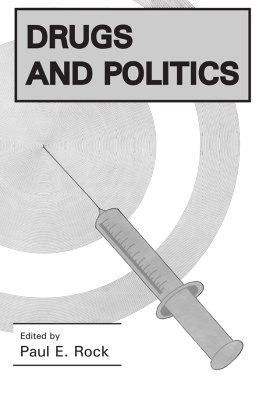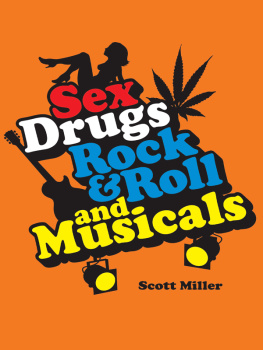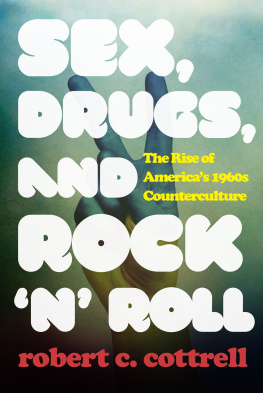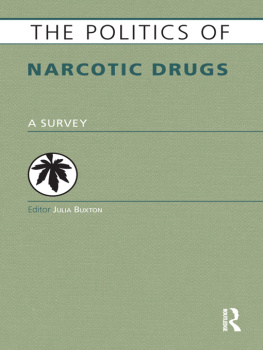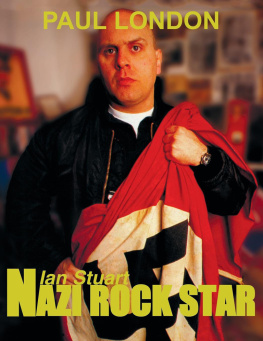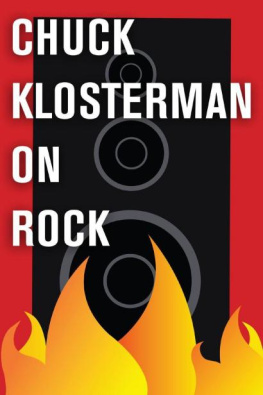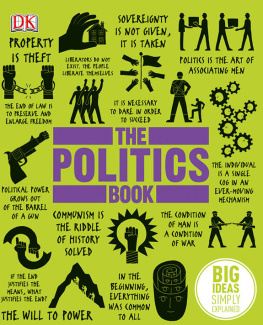First published 1977 by Transaction Publishers
Published 2017 by Routledge
2 Park Square, Milton Park, Abingdon, Oxon OX14 4RN
711 Third Avenue, New York, NY 10017, USA
Routledge is an imprint of the Taylor & Francis Group, an informa business
Copyright 1977 by Taylor & Francis.
All rights reserved. No part of this book may be reprinted or reproduced or utilised in any form or by any electronic, mechanical, or other means, now known or hereafter invented, including photocopying and recording, or in any information storage or retrieval system, without permission in writing from the publishers.
Notice:
Product or corporate names may be trademarks or registered trademarks, and are used only for identification and explanation without intent to infringe.
Library of Congress Catalog Number: 76-1766
Library of Congress Cataloging-in-Publication Data
Data Drugs and politics.
Includes bibliographical references and index.
1. Drug abuseUnited StatesAddresses, essays, lectures. 2. Drug abuseSocial aspectsUnited StatesAddresses, essays, lectures. 3. Narcotics, Control ofUnited StatesAddresses, essays, lectures. I. Rock, Paul Elliott.
HV5825.D789
362.2'9'0973
76-1766
ISBN 0-87855-076-3
ISBN 0-87855-572-2 pbk.
ISBN 13: 978-0-87855-572-7 (pbk)
ISBN 13: 978-0-87855-076-0 (hbk)
Paul E. Rock
Reconstructing and reporting the history of a social problem is always a difficult and speculative enterprise. Substantial areas of the problem may never have been recorded because they were covert or concealed. Those unknown areas form an uncertain context for interpreting the residue that was intentionally or unwittingly left for others to examine. The residue itself is composed of contributions made by people who were often engaged in masking or transforming the possible significance of what they were doing. The worlds of legislators, control agents, and deviants tend to be complex, ambiguous, and marked by internal contradiction. They revolve around practices that are variously discredited or discreditable; designed for very diverse audiences; expressly public or intensely private; and shaped by conflicting, perhaps irreconcilable, imperatives and principles. Each practice assumes a different meaning when it is individually evaluated. Only a few facets of such worlds will ever become visible, they are politically laden, and those facets that can be inspected must be treated circumspectly.
The perspectives offered on one major American problem, the consumption and regulation of illegal drugs, have been particularly confusing. Although the history of the problem remains largely opaque, few forms of deviancy have ever been made to seem so totally or lavishly revealed. The perspectives flowed from almost all the groups whose lives have been touched by drugs: sociologists, psychiatrists, lawyers, legislators, police officials, drugtakers, and others have attempted to impose a definitive form on the social problem. The perspectives are numerous, contrasting, and couched in such discrepant vocabularies that they defy all neat synthesis or summary. Their discord emphasizes the political and contentious nature of drugtaking. The criminal law has rarely been so exposed to dissent.
Although laws manifestly do change, they typically do so because they fall into disuse or are made to undergo an orderly, restrained process of modification or repeal. The buttresses of law are massively powerful: they are built around force, the mobilization of much symbolism and ritual, and the capacity of law to become a reified moral entity. Very few people are able to provide effective resistance: even if they break the law with impunity, they cannot destroy its legitimacy or moral authority. Thus, in the main, the latent ambiguities of lawbreaking are controlled and suppressed. When laws are first drafted and debated, certain conceptions of social order are systematically denied credibility and relevance. A legal system can retain coherence only at the cost of a restricted vision of social life. When breaches of laws are judged, there may be institutional provision for dispute about the circumstances surrounding the possible transgression, but there cannot be a detailed scrutiny of the political and ethical propriety of the rules themselves. Most instances of crime and deviancy are thus enveloped by a canopy of formal definitions and understandings that receive no overt or effective challenge. Isolated attempts to negotiate the significance of law are continually being made, yet they lack much impact. When a Genet, de Sade, or Cleaver issues some alternative construction of the meanings of sexual deviancy, his interpretation is generally held to be peripheral, perverse, and insubstantial. When limited collective action is initiated by a Gay Liberation Front or the Black Panthers, it is most usually without any immediate consequence. Over time, such challenges may lead to a revision, but their effects can rarely be minutely traced or ascertained.Even when the opposition flows from some segment of the state itself, it tends to be rapidly discredited. Canadian, British, and American commissions produced reports on drugs that were dismissed as contaminated, foolish, and unworkable. Moreover, concerted and sustained opposition to a set of criminal laws is uncommon because those people who might offer it are normally constrained to be secretive, ill-organized, and committed to a show of compliance. A readiness to champion the stigmatized can itself confer stigma and rob the advocate of his authority and plausibility. Publicly, at least, the criminal law reflects and supports a monolithic consensus.
In part, the extraordinary variety and subversiveness of the ideas that were raised about drugs may be attributed to the peculiar qualities of those people who were led to experience legal control. Most of the drugtaking population was politically mute, as all deviant populations are. Many may even have acquiesced in the formal interpretations of their activity. Edwin Schurs work in Britain certainly suggests that this has been so. But the dramatization and negotiation of the public significance of a phenomenon have never depended on the intervention of the mass of people who are affected by it. The work of undermining the official definitions of drug use was taken up by a relatively small number who were somewhat socially distant from the common user. Indeed, controversy became salient only when drugtaking was embraced by this rather distinct group. The contribution that was made by the articulate lent a special gloss to the meanings of drugs. Other versions that might have complemented or competed with such accounts can only be derived indirectly from the ethnographic work that was undertaken among the relatively mute users. The early article by Finestone, Cats, Kicks, and Color, and the ones by Sutter and Feldman that are reprinted in this book, provide some understanding of alternative organizations of the drug experience.


